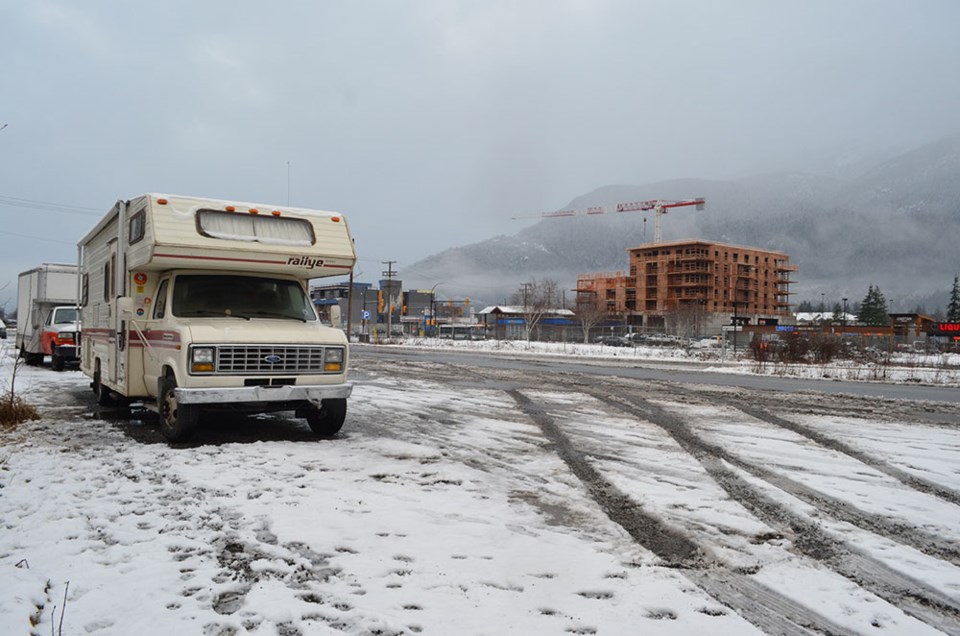As the snow started to stick to Squamish roads on Jan. 10 — and then weather worsened to blizzard conditions the next week — the vans, campers and RVs that take up residence around town were covered in a thin layer of white.
While no one seems to have a concrete number of how many people live in vehicles in Squamish, The Chief reporters knocked on doors to ask how some vanlifers are dealing with the winter season.
Behind the wheel
From where Nicholas Siemens parks his RV on Logger’s Lane, he can see much of Squamish’s downtown construction — including the site where he works.
He agreed it’s ironic that he helps build homes, but can’t afford to live in one. Originally from Alberta, Siemens said he came to town for the construction work three months ago, mostly doing wood framing and drywall. He said it’s nicer working inside this time of year.
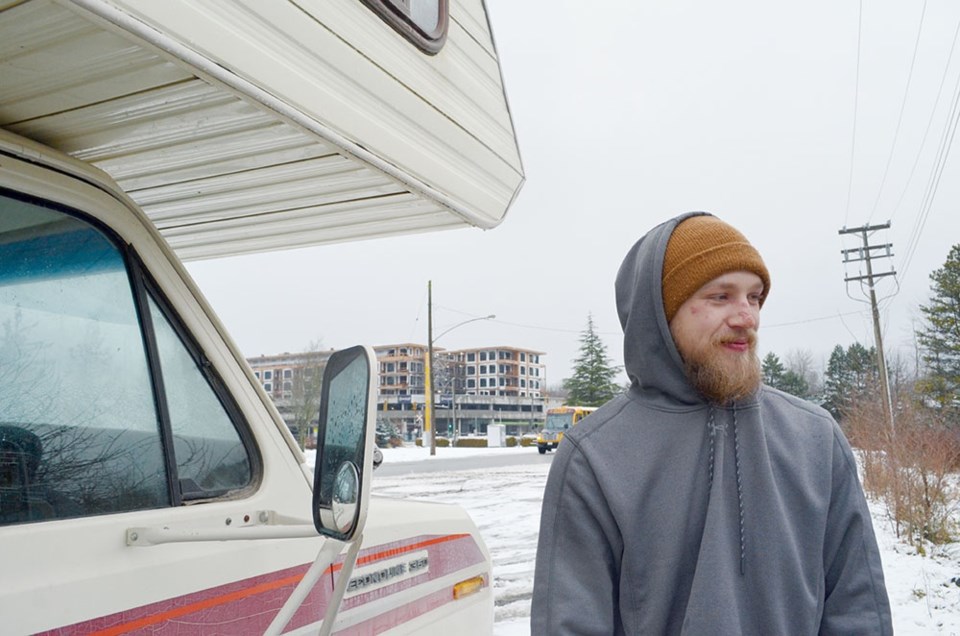
“I was planning on getting a place for the couple winter months, because no one wants to be sleeping outside in the cold,” Siemens said. “But a vehicle’s one of the cheaper options. There are people out in the bushes some places out here, too. You see some people packing their tents up in the morning, which is pretty crazy.”
He was recently in a car accident, forcing him to briefly take time off work. Since he lives with his dog and cat, Siemens said he hasn’t been able to find pet-friendly, affordable accommodation.
All the way from France, Roxane Quintin and Alexis Mysak are a young couple (also with their dog) who drove across Canada in their Dodge Caravan, before eventually buying an RV to stay at the Mamquam River Campground for the season.
They were told, while living in their caravan in Quebec for a year, that the winters in coastal B.C. are much milder and more suitable for vanlife.
While Quintin and Mysak found Squamish on the road while driving up from Vancouver, Rodney Moule is a third-generation Squamish resident whose family has lived here since 1919.
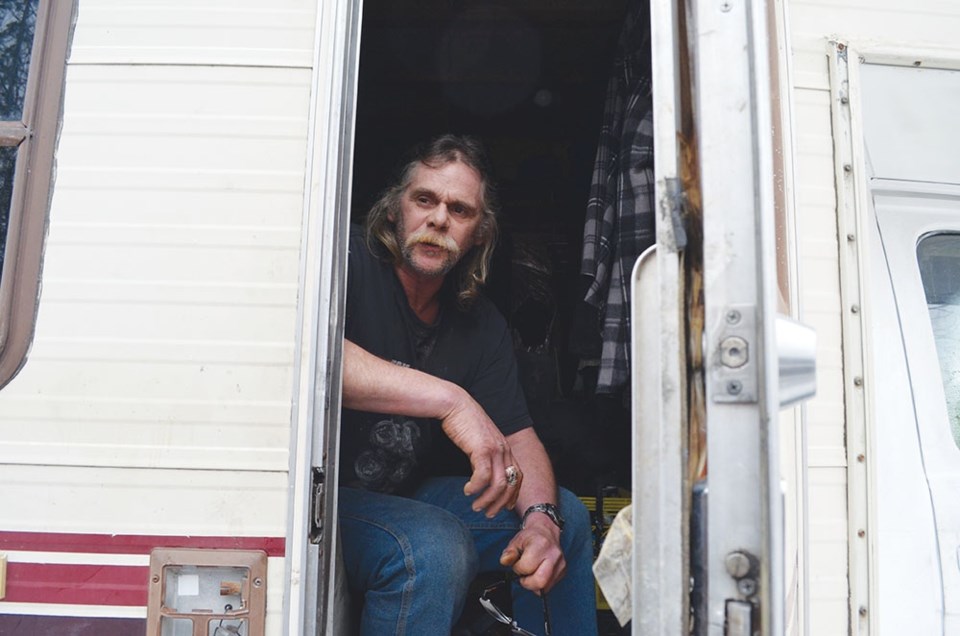
Moule has lived in his RV for two years.
“I had no other choice. I’ve been on disability for 10 years now. I tried going back to work for a year and a half. My back and shoulders and knees and everything couldn’t handle it, so I had to go back on disability. Then I couldn’t afford to live anywhere,” he said. “I picked this up for $500. Keeps me dry.”
Winter essentials:
The number one concern when overwintering in a vehicle is heat, vanlifers told The Chief.
Heat source: Quintin and Mysak recommend getting a wood stove, as it’s cheaper and provides a dry heat. Dry heat can help prevent condensation.
Hot shower: The couple said most vanlifers have a place to shower, which may include a gym membership or going to the pool. Moule said he uses the shower at Squamish Helping Hands, which also offers access to a bathroom and laundry facilities.
Warm food: Mysak recommends a hot meal that’s easy to cook, like soup.
Video by Steven Chua.
Making an RV a home
There are multiple factors to keep in mind with living in a vehicle. Quintin said she feels more secure living with their dog — who will bark whenever someone approaches — and staying at the campground also gives a sense of safety. There, the couple doesn’t have to move their RV and van every day. But during the winter, their main concern is warmth.
Both Quintin and Mysak have lived in vans for stints of time. Quintin and her parents would travel in their van during summers in Europe, while Mysak lived out of a van while spending two months in Australia. For both, this is their first winter living full-time in a vehicle.
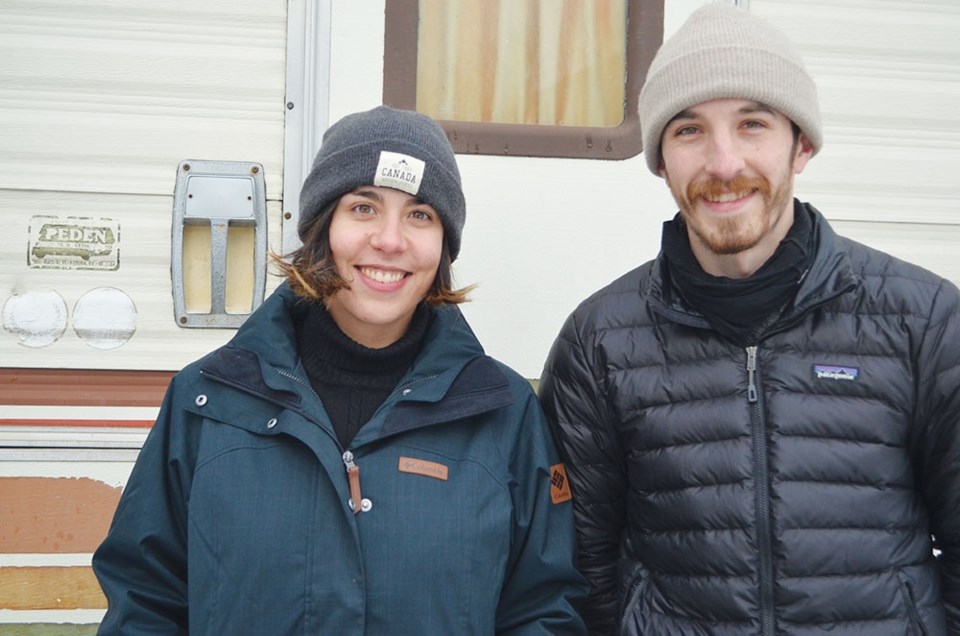
At first, their RV had an internal heating system, but it broke. With no electricity at the campground, the couple purchased a generator. They collect rainwater to wash their dishes, and are often kept busy keeping up with repairs.
When asked if they would move in if they found a reasonably priced apartment, Quintin said, “Maybe, but we are free with our RV. We have a dog and if something happens with the dog inside, we don’t have any pet deposit. I’m pretty good in the van.”
The couple had tried to find apartments in Vancouver and Squamish, but found that they were often too expensive. Quintin and Mysak both felt the people renting out the rooms didn’t really want to share the space, but just wanted someone to pay rent.
“I prefer to live in the van instead of live with people who don’t really want to live with other people — and stress about the dog,” Quintin said.
“You get used to the cold,” Mysak added.
“It’s quite a good van,” she added. “I mean, people are living in less comfort.”
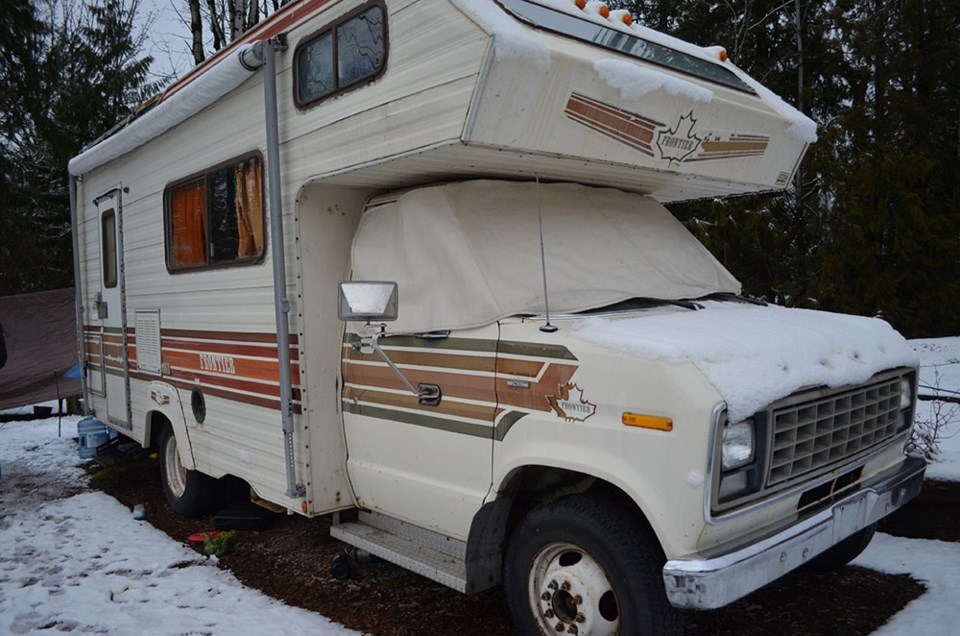
Before the blizzard hit, Siemens said he’s used to the much colder winters of Alberta.
“I’m not too much of an outdoors person, so I’ve just been trying to stay warm,” Siemens said of spending a Squamish winter in his RV. “You don’t have the normal things a house does. You don’t have running water, is like a huge thing. Pretty much camping all the time, unless you have some sort of eco-home setup or some new camper.”
Moule also said winter doesn’t affect his living situation too much. If it gets cold, he’ll turn on the heater. He said he doesn’t miss living in a building. Moule said he takes his garbage to the Squamish Adventure Centre, and GFL comes to his RV to empty out his washroom’s Tidy Tank. For a shower, he visits Squamish Helping Hands.
“How am I hurting anybody by staying right here?,” he asked. “It’s a back road and there’s nobody around.”
When asked how he felt about the housing situation in Squamish, Moule said, “Pretty shitty. There’s lots of housing going up, and nobody can afford to buy it and rent it.”
He’d like to tell the municipality that they could have something set up in an empty lot for people living in their vehicles, even if they paid money to use it.
Local numbers:
At Squamish Helping Hands, the shelter has seen a significant increase compared to previous years, Maureen Mackell, executive director of the Squamish Helping Hands Society, said. While they previously averaged around 15 people a night, they now often accommodate 20 per night.
“SHHS has committed to ‘Everybody, Every Night’ policy so that we are turning as few people as possible away during cold weather months,” Mackell told The Chief in an email. “Living in vehicles is particularly difficult in cold weather so this may be influencing our increased overnight numbers.”
The society is planning a homeless count for April, which may determine how many people live in their vehicles in Squamish at that time.
The District of Squamish also doesn’t have statistics on how many vanlifers there are.
“There has been no change however with respect to the housing crisis in our community,” Mackell wrote. “Affordability is still the main barrier/issue to people being housed along with very little in the way of supportive housing until Under One Roof is up and running.”
The bottom line
Of all the vehicle residents The Chief spoke to, their accommodations ultimately came down to affordability and lack of housing options. All said they would eventually leave Squamish.
Mysak said he believes there are different categories of people who live the vanlife. There are those who want the freedom to pursue outdoor activities, those trying to save money and those who can’t afford another place to live. For the couple, they say they’re trying to make the best of the situation.
While they travel in Canada on their two-year visa, Quintin and Mysak currently don’t have jobs. They plan to return to work once they move back to Quebec when the weather is nicer in the spring.
“We struggle every day,” Quintin said. “So yeah, we’re going to work, but we can wait. We don’t do nothing all day long, you know. Every simple task is hard. You want to do the dish wash? OK, but you have to have some rainwater. It’s not raining? OK, so I can do it outside because we don’t have any water [inside].”
While Moule said most people don’t have a problem when he tells them he lives in his vehicle, he said some people walking down the street where he parks will yell at him to ‘Get a job.’
“Well, if I could get a job, I would,” he said.
Moule said if his father wasn’t still in Squamish, he would probably move. Most of his friends have died or moved away, he said.
When asked how long he is planning on staying in Squamish, Siemens said, “I guess until the construction’s done.”
